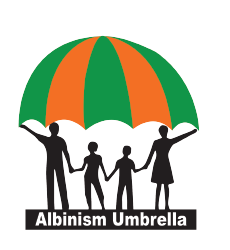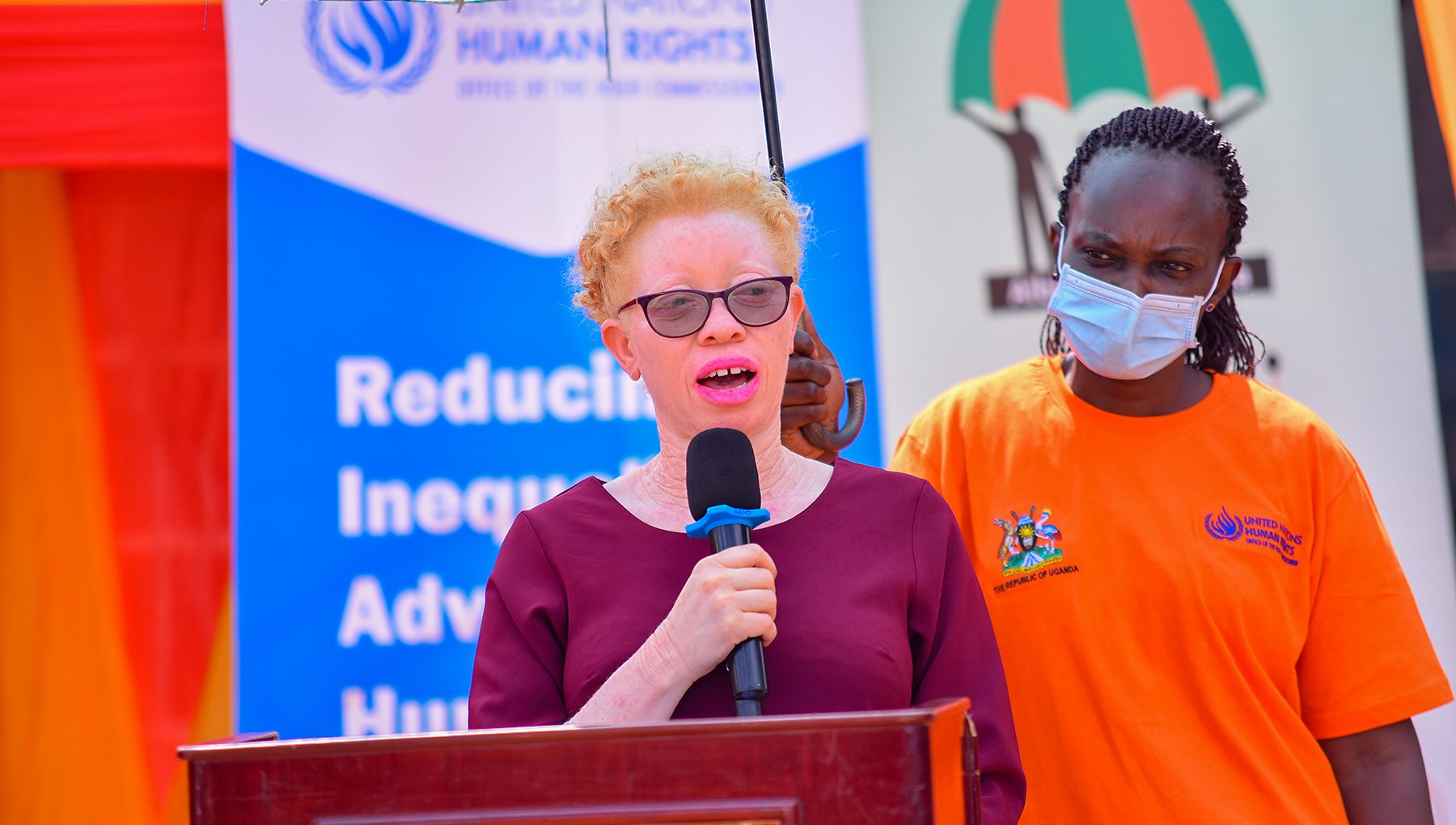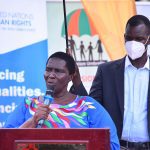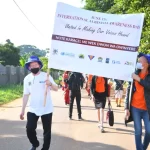- The Chief guest
- Country Director OHCHR
- Development Partners
- District/City officials
- Members of the disability fraternity
- Officials from MGLSD
- Leaders of Organisations of Persons with Albinism
- Media Fraternity
- Technocrats present
- Ladies and Gentlemen
On behalf of Albinism Umbrella, the albinism fraternity and on my own behalf, I welcome you to this event where we are commemorating the International Albinism Awareness Day as well as launching the National Action Plan on Albinism. The theme for this year is” United in making our voices heard”.
State of Albinism in Uganda
Ladies and gentlemen
Permit me to define Albinism which is a genetic condition that is manifested at birth where a person completely or partially lacks melanin with evidence of pale or ash grey eyes, no color in hair and the skin. This may be a simple definition but a lot of ignorance persists in the country concerning the condition
It is estimated that 20,000 persons with albinism live in Uganda and world reports put albinism occurrence at 1: 5000 in Sub Saharan Africa.
Over the past few years, some significant efforts have been taken towards addressing discrimination against persons with albinism, the most important being the recognition of albinism as a form of disability by the 2020 Persons With Disabilities Act 2020. This legally opens up opportunities for planning, support and protection of rights of persons with albinism from the Government.
On December, 28th 2014, the United Nations’ General Assembly adopted a resolution proclaiming June 13th as International Albinism Awareness Day in an effort to stop the brutalities against persons with albinism. Over the past seven years, the albinism fraternity in Uganda has been actively participating in the commemoration of the day while putting in mind regional balance i.e. Eastern, Central, Western (2021) and now Northern region. This has been made possible by our partners like the UN Human Rights. A round of applause to them.
We are excited that again for the first time, the Government of Uganda is fully on board to commemorate this day herein Lira. Lira city aren’t you excited about this?? We are all greatly for this far we have come. MGLSD we really appreciate our home coming…
Milestones on interventions:
- Formerly, albinism was not recognized at all in Uganda until June 13th 2014 when UN resolution (HR council) recognized the condition and designated this very day (IAAD) to raise awareness.
- Recognition of albinism as a form of disability in the 2020 Persons with Disabilities Act. This significant effort purposed to address discrimination against persons with albinism.
- Albinism Umbrella has been able to collect National representative data on persons with albinism in all the 4 regions of Uganda. So far, over 1200 persons with albinism have been digitally mapped across the country.
- Development, validation and adoption of the NAP by the MGLSD.
- Existence of a Situation Analysis Report of human rights challenges of persons with albinism in Uganda, which identifies some key challenges affecting the albinism community and makes recommendations to support planning and design of effective strategies for addressing those challenges.
- Parliamentary Fundraising walks towards the establishment of a rehabilitation center for persons with albinism. Over 120 million has been raised in the previous four campaigns.
- We have also engaged Uganda Cancer Institute & made input to the national cancer policy, cancer awareness, surgeries and screening-SNUPA
- We have expanded our network for inclusivity in service delivery- NCPD, MGLSD, MOH, MOES, NUDIPU, NAWOU, Parliament of Uganda, UHRC, EOC.
- Continued to provide free sunscreens to persons with albinism in all regions
- Job placements & provision of start-up kits to some persons with albinism
- Provided legal services and sought justice for some persons with albinism with support from EOC, Bare Foot Law and FIDA Uganda.
- Organised persons with albinism in groups to benefit from government programs. e.g Buikwe- Wakisi, Kamuli- Bugulumbya, Hoima city, Luweero-Kikyusa and Lira city division.
Challenges
- A report on spatial mapping research on persons with albinism 2021 categorises poverty, ritual sacrifice, sight, stigma and skin as the major challenges affected by persons with albinism in Uganda.
- The same report indicates that cancer claims 80% of persons with albinism in Uganda. This calls for a constant supply of sunscreen lotion and organising cancer screening campaigns.
- Discrimination and stigma in the society and in accessing services such as education and healthcare. This is because of myths, beliefs and superstition associated with their condition
- In Uganda, negative community perceptions towards people with albinism still exist. Studies carried out in the Busoga sub-region show that up to today, giving birth to a child with albinism is associated with shock and rejection in many communities although some communities show empathy and accept such new-born babies (Taylor et al., 2021). With such perceptions still in place, it is very difficult for persons with albinism to be engaged in meaningful livelihood activities such as farming and business. This is because these negative perceptions may shape the way commodities are bought from persons with albinism and or business is conducted with them.
- Research also indicates that there are so many refugees with albinism in settlements of Rwamwanja, Nakivale, Kyaka II and others that face unique and strange challenges, a call to increased sensitization and awareness.
OUR ASK:
- Support to implement the NAP which is to be launched today.
- Inclusion of sunscreens on the National drug list. This will increase sunscreen consumption and reduce the number of persons with albinism that succumb to cancer.
- The Uganda Bureau of Statistics indicates that the percentage of persons with disabilities is 12.4 % of the entire population of Uganda. There is need to disaggregate persons with albinism data for better inclusion and service provision.
- The inclusive policy on Education needs to be finalised to ensure all learners are safe and comfortable at school.
- There is urgent need to create awareness to change community attitude and perceptions and sensitize communities within which persons with albinism live. The sensitization should aim at spelling out the causes of albinism, causes of skin cancer and its prevention how to prevent among persons with albinism.
Ladies and gentlemen
As we launch the NAP, I take this opportunity to thank the MGLSD, OHCHR, the steering committee and other stakeholders who have made every effort possible towards the development of this document.
My sincere thanks go to the Government of Uganda, the UN Human Rights, Open Society of East Africa, Uganda Human Rights, the Equal Opportunities Commission and other development partners who have supported the albinism community. I also want to use this opportunity to call upon all development partners and other stakeholders to join and support the implementation of the National Action Plan geared towards inclusion of persons with albinism.
Thank you for listening, Afoyo, Asante Sana.
FOR GOD AND MY COUNTRY.
Last modified: January 8, 2024













